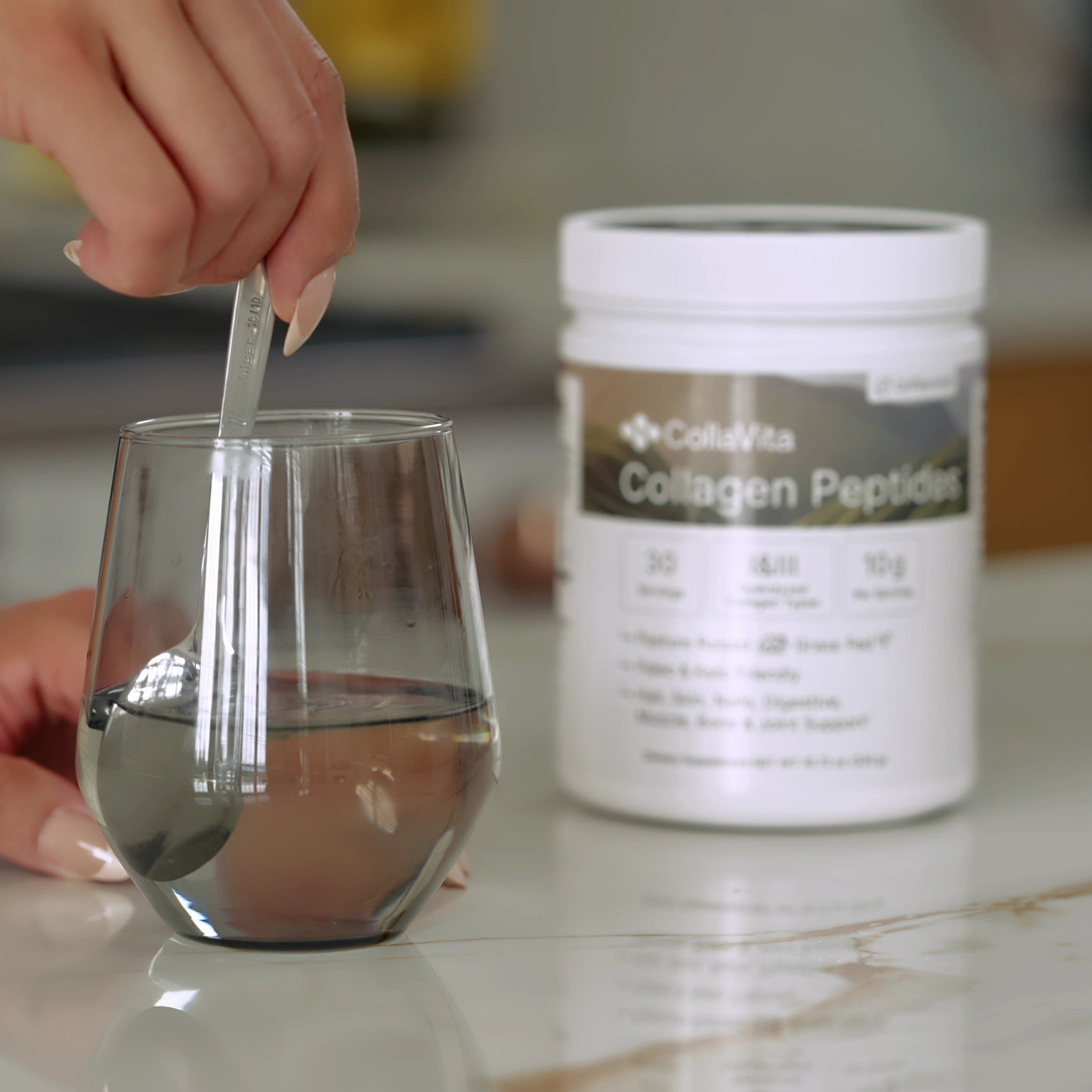What are the Forms of Collagen Supplements?
Collagen supplements are available in 3 main forms: powders, pills (including capsules and tablets), and liquids. The most popular forms are also available as drinks, bars, shots, and gummies.
Here are the forms of the collagen supplements;
Powdered Collagen:
Powdered collagen is a collagen supplement typically containing highly hydrolyzed collagen peptides. It is consumed when mixed with liquids and can be easily added to various drinks, smoothies, and recipes. This form of collagen is often preferred because it allows for higher doses. Additionally, flavored options are available.
Collagen Pills (Capsules and Tablets):
Collagen pills are dietary supplements typically in tablets or capsules designed to provide collagen, a protein essential for skin, hair, nails, and joint health. While gelatin capsules containing collagen powder are the most common, tablets—made from compressed powder—are less frequently used. Many people prefer pills for their ease of portability and convenience. However, collagen pills often contain a lower dosage of collagen and may present swallowing challenges for some individuals. In contrast, capsules dissolve more quickly and are more bioavailable than tablets.
Liquid Collagen:
Liquid collagen supplements contain collagen in a ready-to-drink form, characterized by a slightly thicker consistency than water. They are conveniently packaged in disposable bottles or sachets, making them easy to carry. While some of these supplements may taste bitter, others are flavored to improve the overall experience.

Collagen Powder vs. Pills: Which Is Better?
The comparison of collagen powder vs. pills highlights that each form of supplemental collagen has distinct benefits. Powdered collagen can be easily mixed into various foods and drinks. It can be more economical as it is usually sold in large containers, and its taste can be easily masked. Also, collagen in powder form may contain more collagen per serving. However, if the powder does not mix well with the liquid collagen peptides, it can cause the drink to be lumpy and needs to be mixed well before use as the molecules can settle to the bottom.
Collagen pills are easy to swallow and are often preferred as a first option. The gelatin encases the capsules, which consist exclusively of collagen powder. However, they might make use of fillers and chemical stabilizers. For the body to absorb collagen capsules, stomach acid must dissolve their thick coating. However, this process only accounts for 40-45% of the total effort. It may be necessary to take numerous pills at once as directed by the doctor, as one tablet usually contains 1000 mg of collagen. This is one big problem with many medications, to be honest.

Pros and Cons of Collagen Powder
In this section, we will go over the pros and cons of the benefits of collagen powder.
Advantages of Collagen Powder:
Here are the 8 advantages of collagen powder.
- Versatility: Collagen powder is a versatile ingredient complements various dishes and drinks. Thus, it can be easily incorporated into daily routines.
- High Collagen Content: Powdered collagen often has a higher collagen content per serving than pill-form collagen. It is possible to achieve a more potent dosage this way. Getting the same amount of collagen protein from 12 pills might be much, but only one scoop of powder can give you roughly 7 grams.
- Room for Additional Ingredients: Powdered supplements have the potential to include other substances like hyaluronic acid and vitamin C, among others. This can make the supplement work better.
- Cost Effectiveness: The best collagen powder is typically less expensive than pills. For instance, a supplement containing 10 grams of collagen in pill form would cost around $1.25, whereas the powdered version would cost around $0.75.
- Better Absorption: Powdered collagen is more readily absorbed by the body because it has been broken down. The body can easily utilize hydrolyzed collagen because it contains tiny peptides broken down into amino acids.
- Variety of Flavors: Collagen powders are available in various flavors from various brands.
- Heat Resistance: The structure of the best collagen powder for women remains intact even when subjected to high temperatures, making it ideal for use in cooking and boiling. Because of this, the powder can be eaten by incorporating it into food.
- Faster Results: Higher dosages in powder form can yield more rapid results, particularly for hair and skin health.
Disadvantages of Collagen Powder:
Here are the disadvantages of collagen powder.
- Requires Preparation: Before ingesting powdered collagen, it needs thorough mixing. This can be cumbersome when you’re busy. Poorly mixed collagen powders may form clumps or result in a gritty texture. Consequently, the flavor and consistency of the drink may be affected.
- Tasteless or Bitter Taste: Certain collagen powders, particularly unflavoured ones, may exhibit a neutral or slightly bitter flavor profile. Sweetened or flavored collagen powders are also available.
- Inconsistent Dosage: Collagen powder can settle due to molecule size variations, affecting dosage. The amount in each spoon may differ, so ensure thorough mixing.
- Portability Issues: Unlike tablets, powdered collagen supplements are typically packaged in cumbersome containers, which can make traveling with them a bear.
- Additives: Certain collagen powders might contain artificial sweeteners, flavors, synthetic dyes, and preservatives. Consequently, it is essential to meticulously examine the labels to select supplements with the purest ingredients.
Pros and Cons of Collagen Pills
Below is a summary of the collagen pills' benefits and drawbacks:
Advantages of Collagen Pills:
Here are the advantages of collagen pills.
- Ease of Use: Collagen pills are a quick and easy-to-swallow supplement. They are perfect for busy people or those short on time because they do not need to be mixed or prepared beforehand.
- Precise Dosage: The collagen pills make it easy to see how much collagen is in each pill.
- Portability: The pills are small and easily portable. They are convenient for traveling or daily life and can be transported in different containers.
- Simplicity: This method is ideal for those who want to take collagen supplements simply and easily. RefIt is also known "pop and go!", t andlows for a quick collagen intake.
- Habit: For many people, regularly taking pills is simply a habit. Collagen pills can, therefore, be easily integrated into the daily supplement routine.
Disadvantages of Collagen Pills:
Here are the disadvantages of collagen pills.
- Low Collagen Content: Collagen tablets generally contain lower collagen per serving than powder, with each pill having about 100–200 mg compared to 5,000 to 10,000 mg in powder. To meet daily collagen needs, you may need to take several tablets.
- Slow Absorption: The absorption rate of pills could be lower than that of powder or liquid versions. The acid in the stomach must dissolve the capsules before the body can absorb their contents.
- Fillers and Binders: Collagen pills may contain fillers and binders, which can cause allergic reactions or digestive issues for some.
- Difficulty Swallowing: Some people have trouble swallowing pills. Of the adults in the United States, 40% have difficulty swallowing capsules, and one-third of the population gags or vomits when they do so.
- Large Pill Sizes: Some collagen pills have rather large sizes, which might make swallowing them a challenge.
- Limited Ingredients: Pill size restricts adding beneficial ingredients like vitamin C, while powder supplements can include more.
- Price: Collagen pills can often cost more per serving than powder. For example, to get 10 grams of collagen, the pill may cost more than the powder.
- Gelatin Content: Collagen capsules, typically gelatin-based, aren't suitable for vegans or vegetarians. Opt for powder for higher doses and quicker results or pills for convenience.
Comparing Liquid Collagen to Powders and Pills
Liquid collagen is 90-95% absorbed by the body, which is a much higher absorption rate than other forms. Because it is in liquid form, it is more easily absorbed in the digestive tract and enters the bloodstream faster. Thanks to its high absorption rate, the best liquid collagen can work faster, which is especially advantageous for people who want to see fast results. Furthermore, liquid collagen usually comes in a ready-to-drink form and is available in pre-portioned bottles or sachets. This makes it easy to incorporate the supplement into a daily routine and increases portability.
Powdered collagen, on the other hand, requires mixing before consumption, which can be inconvenient for some users. Liquid collagen is pre-portioned, so you get the same amount each time. However, dosage inconsistencies can occur with powdered collagen due to the possibility of molecules settling to the bottom.
Liquid collagen is generally more costly than powder and pill forms. The price may be higher because it is in a ready-to-drink form and has a higher absorption rate. Some liquid collagen supplements may taste bitter, but some brands address this by adding sweeteners or flavors.
Liquid collagen products may require refrigeration to maintain their freshness, while powders and pills are easier to store. Some liquid collagen supplements may contain chemical fillers, which may concern some users. Therefore, it is important to read product labels carefully.
Liquid Collagen: The Benefits and Drawbacks
Liquid collagen is a prominent form among collagen supplements and has distinct advantages and disadvantages. Here are the properties, liquid collagen benefits, and potential disadvantages of liquid collagen:
Benefits of Liquid Collagen
Here are the benefits of liquid collagen.
- Fast Absorption: Liquid collagen has a 90-95% absorption rate, significantly higher than other forms. Its liquid state enables quicker absorption in the digestive tract, leading to faster results.
- Ready-to-Use Format: Liquid collagen usually comes in ready-to-drink form in preportioned bottles or sachets. This makes incorporating the supplement into daily routine easy and increases its portability. Unlike powdered collagen, liquid collagen requires no mixing or preparation.
- Consistent Dosage: Because liquid collagen is pre-portioned, it ensures that you get the same amount of collagen each time. This is advantageous for those who want consistency in dosage.
- Additional Ingredients: Liquid collagen supplements are often enriched with vitamin C, hyaluronic acid, and other beneficial ingredients. These ingredients can enhance collagen's benefits and support skin health and moisturization.
- Easy Consumption: Liquid collagen can be consumed directly without mixing it with water or other liquid. This is ideal for people on the go or those with limited time.
- Smooth Texture: Liquid collagen does not create mixing issues like powdered collagen. Therefore, it does not form a lumpy or sandy texture during consumption.
Disadvantages of Liquid Collagen
Here are the disadvantages of liquid collagen.
- High Cost: Liquid collagen is more costly than powder and pill forms. Its price may be higher because it is in ready-to-drink form and has a high absorption rate.
- Taste: Some liquid collagen supplements may have a bitter taste. This can be a disadvantage, especially for people with sensitive taste buds. However, some brands try to solve this problem by adding sweeteners or flavors.
- Preservatives: Some liquid collagen products may contain preservatives to maintain freshness. This may be a concern for those who prefer natural and unadulterated products.
- Storage Conditions: Some liquid collagen supplements may require refrigeration, which can be difficult to do when traveling or used in the office.
- Fillers: Some liquid collagen supplements may contain chemical fillers. To avoid such substances, it is important to read product labels carefully to
- Less Collagen Content: Supplements in liquid form may generally contain less collagen per serving than powder-form supplements.

Key Differences Between Liquid, Powder, and Pills
The body absorbs collagen liquid far faster than any other form of collagen. Liquid collagen is typically pre-portioned and available in a drinking form, making it straightforward to use. The downsides of liquid collagen are its higher price tag and the potential bitterness of some brands.
Although its absorption rate is lower than liquid collagen, powdered collagen is still quite absorbable. Smoothies and coffee are great places to use for convenience, but be warned that it won't dissolve entirely and could leave a grainy residue.
Conversely, pill collagen is notable for its portability, convenience, and lowest absorption rate. Collagen pills, on the other hand, may have delayed absorption and a lesser collagen content. Additionally, vegans should be aware that some pills contain artificial fillers. The table below lists the challenges of collagen pills vs. powder, and the following table lists the differences between collagen pills and powder and their disadvantages.
| Feature | Liquid Collagen | Powdered Collagen | Pill Collagen |
|---|---|---|---|
| Absorption Rate | Highest (90-95%) | Good, especially if hydrolyzed | Low (40-45%) |
| Usage | Ready to drink, practical | Mixing with liquids, versatile | Easy to swallow, portable |
| Price | Highest | Affordable | Can be affordable, it is necessary to consider the dosage |
| Dosage | Generally lower | Generally higher | Usually lower, may need to take more pills |
| Additional Content | Vitamin C, hyaluronic acid | May contain flavors, sweeteners, and additives | May contain fillers, binders, and gelatin |
| Taste | Can be bitter | Maybe chalky or bitter in some people | Tasteless |
| Compliance | Those who want fast and easy operation | Versatile use, those who wish to a high dose | Those who want portability, easy handling |
How to Choose the Right Collagen Supplement for You?
When selecting a collagen supplement, consider your budget, lifestyle, health goals, and personal needs. Start by assessing your collagen needs and health objectives. Type I collagen is a great choice if you aim to enhance hydration, reduce wrinkles, or boost skin elasticity. Hydrolyzed collagen has been clinically shown to reduce wrinkles and minimize skin volume loss.
Type II collagen supplements may be something to consider if you want to lower the risk of osteoporosis, improve joint mobility, or relieve joint pain, according to several studies in the Nutrients (1), (2).
Collagen supplements can help with hair and nail issues, including strengthening hair, reducing hair loss, and preventing brittle nails. Collagen is an essential protein for building and maintaining muscle, so taking good collagen supplements can be a good way to beef up your muscles, especially when combined with exercise.
It is also the body's most abundant protein, so it's a good addition to any anti-aging plan. Consider liquid or pill collagen for optimal results.
If you're looking for the best collagen for women with a busy lifestyle, liquid collagen is a convenient choice. Liquid collagen is portable and ready to use, while pills are easy to carry and ingest. Powdered collagen offers versatility as it can be mixed into foods or drinks and is ideal for soups, coffee, and smoothies. Collagen supplements in liquid or pill form suit active lifestyles, with disposable sachets common for liquids and pills being easier to transport.
For those on a budget, powdered or pill collagen may be more affordable. Powdered collagen usually comes in larger packages, lowering the unit price. Pill collagen is typically cheaper than liquid options. However, if your budget is flexible and you seek quick results, liquid collagen, though costlier, offers better absorption and convenience.
FAQ About Collagen Supplements
Below, you will find frequently asked questions and answers about collagen types.
What are the sources of collagen in powders and pills?
Collagen pills contain hydrolyzed collagen from various sources, including marine, bovine, pig, and chicken. Their broken-down structure enhances absorption in the body. Popular for their high bioavailability, collagen can also come from animals' connective tissues, skin, and bones.
How can I incorporate collagen powder into my daily diet?
You can easily incorporate collagen powder into your daily diet by mixing it into beverages like coffee, smoothies, or juices, soups and pancakes, or yogurt and desserts. Additionally, it works well in baking recipes, enhancing nutrition and taste.
When should I start taking collagen supplements?
Collagen production begins to decline around the mid-20s, leading to signs of aging, joint issues, and changes in hair and nails. While younger individuals may not need supplements, starting in the 30s can help with visible signs of aging, and supplementation is beneficial by age 50 for overall health.
If you have specific health concerns, collagen supplements can offer several benefits. For those experiencing joint pain, arthritis, or osteoporosis, collagen may help support joint health and alleviate discomfort. Additionally, if you're noticing signs of premature aging, dryness, or a loss of skin elasticity, collagen can be beneficial for enhancing skin health. Moreover, collagen supplements might address hair loss, brittle nails, or weak hair, promoting overall hair and nail strength. Finally, these supplements can play a supportive role in recovery following surgery, aiding the healing process.
Conclusion
Ultimately, the choice of collagen supplement depends entirely on your personal needs and goals. When making this choice, remember that collagen supplements are not just a fad; they can play an important role in achieving your health and youth goals. Each form has advantages and disadvantages, so choosing the one that best suits your lifestyle and needs is one of the most important steps toward maintaining your health and youth.
SOURCES
(1) Inacio, P.A.Q.; Chaluppe, F.A.; Aguiar, G.F.; Coelho, C.d.F.; Vieira, R.P. Effects of Hydrolyzed Collagen as a Dietary Supplement on Fibroblast Activation: A Systematic Review. Nutrients 2024, 16, 1543.
(2) Skov, K.; Oxfeldt, M.; Thøgersen, R.; Hansen, M.; Bertram, H.C. Enzymatic Hydrolysis of a Collagen Hydrolysate Enhances Postprandial Absorption Rate—A Randomized Controlled Trial. Nutrients 2019, 11, 1064.

















